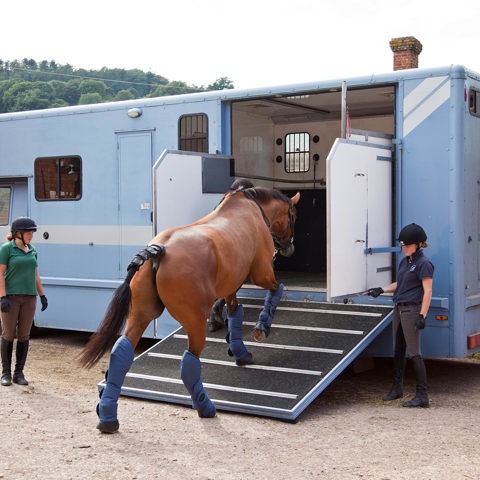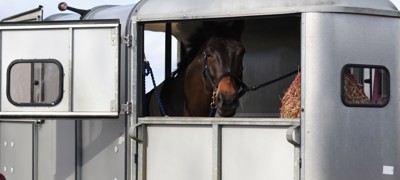Driving a horse box or towing a trailer is very different to driving a car. The additional weight and size of vehicle require extra care to be taken on the roads, as well as consideration for the horse on board.
Driver licencing laws
Ensure you have the correct driving entitlement on your license for driving or towing. You can check what vehicles you are eligible to drive on the UK Governments website.
Check which vehicles you can drive on your licence (gov.uk).
Towing a trailer – new rules from December 2021
chevron-down
chevron-up
There are now new rules for towing a trailer with a car, effective from 16 December 2021. Find out how the changes affect you.
The BHS strongly recommends that anyone new to towing a trailer, or who has not towed in a while, should take training from a qualified driving instructor.
There are many aspects to think about when towing not just the driving; including coupling and un-coupling safely, essential safety checks before you tow, and the weight restrictions of your vehicle and trailer.
Renewing your driving licence at 70
chevron-down
chevron-up
Since 1997, the C1 and/or D1 (small lorry and/or bus) implied entitlements are not automatically renewed at the age of 70. Drivers can apply to have these entitlements re-instated, but they need to meet the higher medical standards of fitness to drive associated with lorry and/or bus entitlements.
A D2 application form and a D4 medical form completed by a doctor is required if the applicant wishes to keep their C1 and/or D1 implied entitlements. These are available from Post Offices that offer driving licence transactions. There is no DVLA fee for this process, but you may have to pay for the D4 medical form to be completed by a GP (and an optician if the GP doesn’t offer eye tests).
Purchasing your own transport
Before buying a horsebox or trailer there are lots of factors to consider.
Consider buying from a manufacturer or dealer; the advantages are that they may offer you a warranty, even if it is second-hand – double check what this covers and how long it last for. Always ask for a written copy of the warranty for your records. Sales will also be covered by the Sales of Goods Act 1979, which offers added protection.
Think about:
- The size and payload needed for your horse(s) and equipment
- If you require a living/grooms section
- Tax and insurance costs
- Maintenance costs of the vehicle – servicing and plating
- What you’re able to drive / tow on your driving license
Hiring a horse transporter
It is important to be aware of what experience, training, credentials and safety checks the horse transporter you are looking to use has. Ask the transporter if they are experienced handling horses, and when their vehicle was last checked for safety.
There are two levels of horse transporter:
Type 1 Transporter
chevron-down
chevron-up
- Needs a ‘Certificate of Competence for Drivers or Attendants’ and can then apply for an Animal Transporter Authorisation
- Requires no checks of the vehicle being used or the competence to handle a horse
- The horse must only be in the transporter’s care for up to 8 hours
Type 2 Transporter
chevron-down
chevron-up
- Needs a ‘Certificate of Competence for Drivers or Attendants’ and can then apply for an Animal Transporter Authorisation
- Must complete and pass an online test, demonstrating their ability to handle, load and drive horses safely
- The vehicle must be inspected by a DEFRA authorised inspector for elements such as safety, ventilation and temperature monitoring
- The horse can be in the transporter’s care for over 8 hours
- If the horse transporter is over 3.5 tonnes, they’re required to have an Operator’s license and display the disc in the windscreen, plus have a tachograph fitted
Breakdown Advice
Do you have breakdown cover in place? If so, is the information easy to find when you are travelling?
Tips
chevron-down
chevron-up
If you are unfortunate to breakdown, we suggest you carry a basic breakdown kit, for example:
- A torch
- emergency life hammer with seat belt cutter
- hi viz jacket/tabard
- powder fire extinguisher to British Standards
- warning triangle,
- jump cables and first aid kits for humans and your equids.
If you must travel during the winter months, be prepared, and carry. Emergency foil blanket, snow shovel and thermal gloves and an extra rug for each equid you carry.
Useful contact numbers if you break down
chevron-down
chevron-up
In the event of an emergency, dial 999
- National Highways: 0300 123 5000
- Traffic Scotland: 0800 028 1414
- Traffic Wales: 0300 123 1213 or 999
- Northern Ireland: 999
Top Tips
- If towing a trailer - check your vehicle insurance includes recovery of a trailer with horses on-board. Many standard policies do not include trailer or livestock recovery. Some providers have horse trailer assistance and equine recovery available as an add-on.
- Have your breakdown policy easily available. Know who to call and your policy number for recovery.
- Know what tyres are on your vehicle and the numbers on them.
- Plan your route – know where safe stopping places are. Remember - go left if there is nowhere to pull in.
- Check weather conditions before you travel as this may impact your vehicle and travelling conditions.
- Check the route before you load to check for any incidents along your route.
- Carry emergency contacts – next of kin and vets.
- Download the ‘What3Words App’. It helps identify your location to a 3m-square location, enabling emergency services and recovery companies to find your exact location.
- When on the motorway or major A road, do not unload your horse unless the police or agencies have granted permission.
- If transporting your horse, check your breakdown cover includes recovery of your trailer, plus have equine specific recovery of your horse, if they cannot repair your vehicle at the road side




